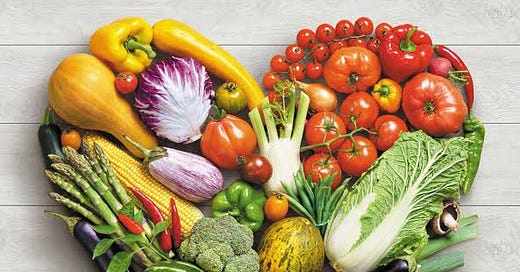Mother nature wants us to shift to plant-based diets
It is the logical conclusion following the figures related to the harm caused by animal-based foods
A plant-based diet, Credit, Harvard health
Recently, reports emerged about an agreement by nearly two hundred countries to help identify the nature of food production, with the deal calling for mobilizing $200 billion a year in the financing from the private sector, governments and philanthropy, as wealthy nations succumbed to the idea of spending $30 billion a year by 2030 to assist poorer nations protect and restore their ecosystem.
At same time, a report emerged not only saying 40 percent of global greenhouse gas emissions stem from the current nature in the global food production, but also that it could prove benefiting if U.S.’s 50 million Catholics (about one-fifth of the American population) shunned meat diets on Fridays, since such a move in Wales led to the estimated reduction of 55,000 tons of carbon annually, equal to 82,000 fewer people flying round-trip from London to New York over the course of a year.
At about the same time, a BBC report concluded that when it came to the reduction of people’s individual carbon emissions, an important move to take include achieving food sustainability, especially as the nature of global food production accounted for 35 percent of all human-caused greenhouse gas emissions.
In other words, the nature of food production plays a huge role in the fall of people’s carbon emissions, and since meat and dairy productions largely get blamed for the global growth of greenhouse gas emissions, it becomes understandable why U.S. Catholics and others become mentioned in the debate.
Beef generates 49.9 kg of carbon dioxide equivalent per 100 g of protein, with the protein from lamb and mutton producing the second highest amount of greenhouse gas footprints, resulting into 19.9 kg of carbon dioxide per 100 g. Cows and sheep belch methane when they digest food, but the global warming impact of methane comes at 84 times higher than carbon dioxide over a 20-year period. Beef and cattle milk on a commodity-basis bring the most emissions, contributing 41 percent and 20 percent respectively of the sector’s overall greenhouse gas emissions, excluding emissions from cow manure and cattle.
Apart from contributing to global greenhouse gas emissions, the nature of food production led to 70 percent of freshwater usage, occupying 40 percent of the earth’s lands, thereby becoming one of the drivers of habitat loss. Animal production accounted for 57 percent of global food-related emissions, compared to 32 percent contributed by plant-based foods, with global livestock production responsible for an estimated 18 percent of anthropogenic greenhouse gas emissions in terms of methane and nitrous oxide.
Animal agriculture produces 65 percent of the world’s nitrous oxide emissions, which has a global warming impact 296 times greater than carbon dioxide. With nearly 15 percent of total global greenhouse gas emissions, livestock for human consumption generates greater emissions than the transportation sector in total.
The reason why accusing fingers get pointed at the animal agriculture sector for the climate change mess, with many calculating the advantages to be derived if the production of animals for human consumption becomes de-emphasized, is because animals for human consumption occupy a leading place in the production of nitrous oxide and the amount of methane in the atmosphere, as well as the presence of carbon dioxide on the planet,
If humanity went vegan, the global food-related greenhouse gas emissions nosedives by up to 70 percent by 2050, while the reduction in emissions could decline significantly when lots of people adopted a year-round meatless diet. The transition to plant-based diets would not only reduce diet-related land use by 76 percent, greenhouse gas emissions through diet-related emissions could fall by 49 percent.
If people cut down on animal diets, waste from the sector witnesses a drastic fall, especially when wealthy nations take part in the exercise, with some saying this could be enough to save the world from the catastrophe predicted through climate change. Carbon footprints could also be cut by 61 percent, if people simply begin to patronize plant-based diets.
New modeling suggests that a switch to a plant-based diet could get humanity half way to bringing down global warming to two degrees Celsius, halting global greenhouse gas emissions for 30 years. Rapid global phase out of animal agriculture could create the potential to stabilize greenhouse gas levels for 30 years and offset 68 percent of CO2 emissions this century.
With global greenhouse gas emissions paused for 30 years, the catastrophe predicted over climate change eases, particularly when the transition to a plant-based diet gets effected, a development putting a halt to the growth of land use, which leads to habitat loss and the decline in global biodiversity.
Many want the reduction of the most carbon-intensive foods (beef, lambs, and dairy) by at least 20 percent per capital to plant-based options, and a further reduction in meat products by 2050. The cutting down on meat consumption, and going completely vegan, may be a step to take in these trying times, when animal and plant species go extinct at the fastest rate in human history, with scientists estimating that some 1 million species are at risk.
What to eat
Vegan diet from Ghana, Credit, Best of Vegan





